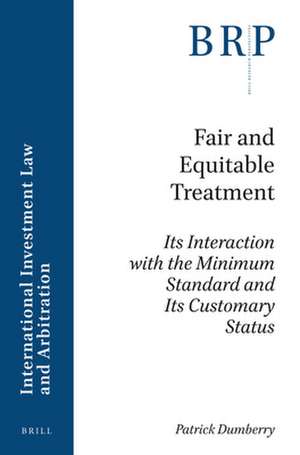Fair and Equitable Treatment: Its Interaction with the Minimum Standard and Its Customary Status: Brill Research Perspectives in International Law / Brill Research Perspectives in International Investment Law and Arbitration
Autor Patrick Dumberryen Limba Engleză Paperback – 28 feb 2018
Preț: 437.35 lei
Preț vechi: 514.52 lei
-15% Nou
Puncte Express: 656
Preț estimativ în valută:
83.71€ • 90.36$ • 70.19£
83.71€ • 90.36$ • 70.19£
Carte indisponibilă temporar
Doresc să fiu notificat când acest titlu va fi disponibil:
Se trimite...
Preluare comenzi: 021 569.72.76
Specificații
ISBN-13: 9789004366114
ISBN-10: 9004366113
Pagini: 82
Dimensiuni: 155 x 235 x 5 mm
Greutate: 0.14 kg
Ediția:VI, 82 Pp
Editura: Brill
Colecția Brill
Seria Brill Research Perspectives in International Law / Brill Research Perspectives in International Investment Law and Arbitration
ISBN-10: 9004366113
Pagini: 82
Dimensiuni: 155 x 235 x 5 mm
Greutate: 0.14 kg
Ediția:VI, 82 Pp
Editura: Brill
Colecția Brill
Seria Brill Research Perspectives in International Law / Brill Research Perspectives in International Investment Law and Arbitration
Cuprins
Fair and Equitable Treatment: Its Interaction with the Minimum Standard and Its Customary Status
Patrick Dumberry
Abstract
Keywords
General Introduction
I The Interaction between the ‘Minimum Standard of Treatment’ and the FET
1.1 The Concept of the MST and Its Customary Status
1.2 The Historical Foundation of the MST
1.3 The Challenge to Existing Customary Rules, Including the MST, Led by Newly Independent States in the 1960s and 1970s
1.4 The New Phenomenon of ‘Treatification’ in the 1990s
2.1 Early Appearance of the Standard in Multilateral Instruments and Current Overwhelming Presence in BITs
2.2 Why Did States Start Referring to the FET Standard Instead of the MST in Their Investment Treaties?
2.3 FET Should be Considered as a Treaty Standard Independent from the MST, Except in Specific Situations
3.1 The Broad Interpretation Given to FET Clauses by Arbitral Tribunals and the Importance They Gave to the Terms Used under These Provisions
3.2 States’ Reactions to These Awards
3.3 CETA: the Ultimate Detailed FET Clause
II Has the FET Standard Become a Rule of Customary International Law?
3.1 Introductory Remarks on the Phenomenon of Custom
3.2 How Can Provisions Contained in BITs Transform into Customary Rules?
3.3 Examination of State Practice
3.3.1 The Practice of States Parties to BITs
3.3.1 State Practice is General and Widespread
3.3.2 State Practice is Representative
3.3.3 State Practice is Not Uniform and Consistent
3.3.2 The Practice of States Outside the Treaty Framework
3.4 Do States Have opinio juris When they Include FET Clauses in their BITs?
General Conclusion
Bibliography
Patrick Dumberry
Abstract
Keywords
General Introduction
I The Interaction between the ‘Minimum Standard of Treatment’ and the FET
1.1 The Concept of the MST and Its Customary Status
1.2 The Historical Foundation of the MST
1.3 The Challenge to Existing Customary Rules, Including the MST, Led by Newly Independent States in the 1960s and 1970s
1.4 The New Phenomenon of ‘Treatification’ in the 1990s
2.1 Early Appearance of the Standard in Multilateral Instruments and Current Overwhelming Presence in BITs
2.2 Why Did States Start Referring to the FET Standard Instead of the MST in Their Investment Treaties?
2.3 FET Should be Considered as a Treaty Standard Independent from the MST, Except in Specific Situations
3.1 The Broad Interpretation Given to FET Clauses by Arbitral Tribunals and the Importance They Gave to the Terms Used under These Provisions
3.2 States’ Reactions to These Awards
3.3 CETA: the Ultimate Detailed FET Clause
II Has the FET Standard Become a Rule of Customary International Law?
3.1 Introductory Remarks on the Phenomenon of Custom
3.2 How Can Provisions Contained in BITs Transform into Customary Rules?
3.3 Examination of State Practice
3.3.1 The Practice of States Parties to BITs
3.3.1 State Practice is General and Widespread
3.3.2 State Practice is Representative
3.3.3 State Practice is Not Uniform and Consistent
3.3.2 The Practice of States Outside the Treaty Framework
3.4 Do States Have opinio juris When they Include FET Clauses in their BITs?
General Conclusion
Bibliography
Notă biografică
Patrick Dumberry, Ph.D. (2006), Graduate Institute for International Studies, Geneva, is Professor at the University of Ottawa. He is the author of more than 60 publications, including The Fair and Equitable Treatment Standard under International Law: A Guide to NAFTA Article 1105 Case Law (Wolters Kluwer, 2013).











